Round 5 of Pittsburgh Chess Club Tournament: psychology of losing another won game
After losing a won game against a difficult opponent last week in round 4, I was hoping to redeem myself in round 5 this week by playing well. I played against a fellow Expert whom I had never played in a tournament game before, but had played a couple of blitz games with several years ago.
Unfortunately, I fell apart even more bizarrely than in last week’s game: I lost another won game, and threw away a draw at the last moment. I have lost two games in a row in which I had a winning position.
This is a report on the game and the raw psychological aspects of what happened.
Why? Well, over the years, many people have come up to me confused about what happened when I fell apart mysteriously in a chess game, and I always found it hard to explain, but this time, I’m giving as detailed an explanation as I can. This is not an easy exercise for me, because it inevitably means facing various demons and admitting to personal weaknesses I (still) have, but my mission since beginning to blog about chess has been to tell the unfiltered truth of what happens to us human, fallible chess players. Whether you already experience this as a serious tournament player or whether you do not play chess, I think you will find the psychology fascinating.
The complete annotated game
At your convenience, you can enjoy playing over the game with my annotations, including diagrams.
Preparation
I did not do any preparation for the game, because I had no idea what opening he was going to play against me as White. Also, I have been very short on time for chess in the past two weeks, during which I have been occupied preparing for music gigs (I performed in one on Sunday and have another one coming up Friday). This among many other things I need to get done before the holidays begin (hence my light blogging lately).
Overview of my game
The opening
As Black, I responded to e4 with the Sicilian Defense, which has been featured in many of my previous games. My opponent played the Rossolimo variation, and I responded with an aggressive if a bit risky continuation:
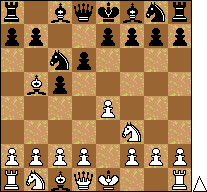
The point is to try to hold on to the two Bishops and the center at the same time. We reached a typical position in which Black is behind in development and has a weaker Pawn structure, but does have the two Bishops:
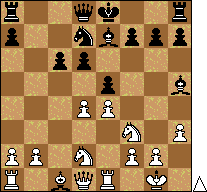
The middle
My opponent started going astray, conceding equality and then reaching a clearly worse position in which he was the one underdeveloped and I was about to take over the center:
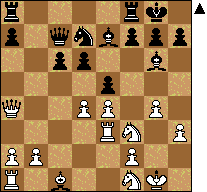
I was very happy at this point, having coming out of the opening with a clear advantage.
Paradox of choice
But the stronger my position got, the more anxious and confused I got! I think this is a result of the paradox of choice. So many good moves, so which is best? Life is easier when there is only one clearly best move, with all other candidate moves being obviously bad. To play chess well, it is necessary not only to achieve a good position, but to keep playing correctly enough to follow up and win.
We reached this position that is just plain good for Black:
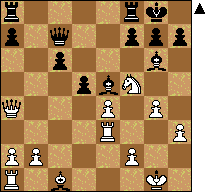
Now, I could have achieved a very strong position, by trading my bad Bishop on g6 for his Knight on f5.
But I grew overambitious: I chose to maintain tension instead of simplifying, waiting for my opponent to weaken his position further, since he had with almost every move since the opening fallen into a worse position.
In short, I was getting psychologically unbalanced and playing subjectively rather than objectively: I was ignoring a perfectly good continuation, which I saw and evaluated, because I was hoping for more.
Strange psychology leading to a winning position
What happened instead was very strange, and does not happen to me often.
Step one: I played a bad move, Rfe8, that could have been punished by an equalizing tactical continuation:
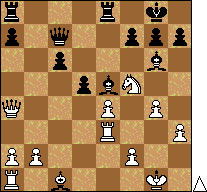
The moment I released my Rook, I immediately saw that exd5 would regain the Pawn, because Black cannot retake, given the tactical idea of f4 attacking the pinned Black Bishop.
But he either missed it or wanted to try for more, and played a different move!
So the psychological game continued. Now that I saw f4, I played a move designed to encourage my opponent yet again to try f4, except that this time it would be a bad move. And he fell for it!
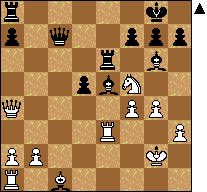
I calmly retreated my Bishop to f6, and (correctly) evaluated that I had a won game: it was just a question of how to deliver the final blow.
My opponent sensed that it was time to try to sacrifice one Pawn to develop his Bishop with Bd2 and hope for a draw:
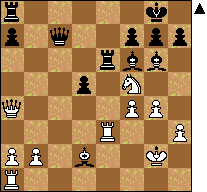
Mentally falling apart
Seeing this brazen move that clearly must lose, I simply fell apart psychologically.
If nothing else, I could just take the free Pawn on b2, and see what happens next. There was no way I could lose if I took the Pawn right away.
Instead, I started having all kinds of weird thoughts. I totally lost control of my wandering mind: I sat for 23 minutes all confused. There’s a saying in chess circles: “long think, wrong think”, or “paralysis by analysis”.
I should have gotten up and taken a little walk outside in the hall to get some oxygen and clear my mind. That probably would have enabled me to continue in the game objectively and calmly.
Instead, after spending too much time with my mind doing who knows what, I lost confidence in my ability to calculate, and looked for a way to go into a fully simplified endgame a Pawn up.
Note: the fastest winning continuation was to trade pieces and push d4.
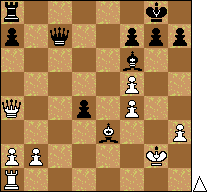
The end
The endgame was not even forced. My opponent could have varied anywhere along the way. But miraculously, it turned out that he did in fact play into the exact line I wanted!
We reached the endgame position I had calculated all along:
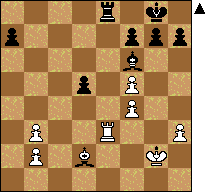
Rejecting the Pawn-up unlosable endgame
At this point, I suddenly changed my plans. I was originally going to trade Rooks and win the b2 Pawn and have a Pawn-up ending in which there was no way to lose, but upon realizing that it was likely drawn, I decided to see if I could find a way to win by keeping the Rooks on the board. I knew it was going to be risky because my King was less active than his King.
We reached this position:
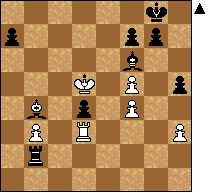
Hallucinating a win
At this point, I suddenly hallucinated a variation that I thought would result in my Queening a Pawn!!
It ended with my playing c2 and grabbing the Black Queen from my opponent’s side of the table, expecting to Queen my c Pawn!!
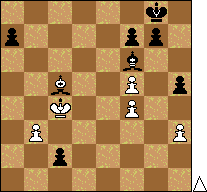
No more win in a drawn position, about to lose the Pawn back
I was left in shock after my opponent played the obvious Ba3:
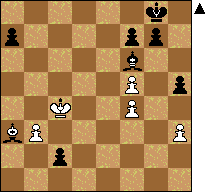
It’s not fun realizing that your mental state has deteriorated so much in the past hour that you hallucinated a win that did not exist.
Accepting that it is a draw
So I did the right thing: I spent precious time calming down, I acknowledged that it was a draw, and I spent the time (I was starting to get into time pressure, under 10 minutes left on the clock) calculating and deciding on a clear forced draw, by trading off White’s f5 Pawn in order to free my King, and I proceeded as planned:
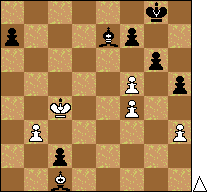
If White plays the obvious fxg6, then the forced line leads to this drawn position I aimed for:
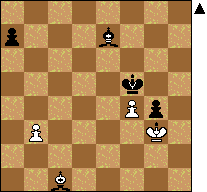
Getting swindled
My opponent cleverly did not play the obvious move, but left his f5 Pawn hanging, playing Kd3:
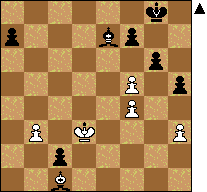
I call this a swindle because it is a move that is based on the hope that Black will
- take the Pawn instead of continuing as planned with the draw variation
- blunder afterwards and drop all the King side Pawns
Unfortunately, that is exactly what happened.
I could have just played Kg7 calmly in order to play Kf6 and force the same variation I had calculated earlier for a draw.
Instead, I took the Pawn, sensing that maybe I could win if my opponent was the one to follow up incorrectly!
But under increasing time pressure, I started playing mindlessly, and my position got weirder and weirder, even if still drawn:
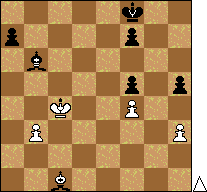
Losing the drawn position
Because of time pressure, I stopped keeping score after this position, which is still drawn:
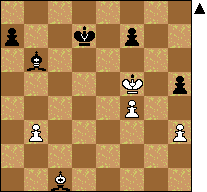
All I had to do was play Bd8 and White can make no more progress.
But the moment I stopped keeping score was also the moment I stopped thinking about my moves and just played randomly. The rest of the game is not interesting. The final position:
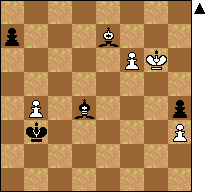
Lessons learned
- I made a lot of bad decisions as a result of hallucinated variations and the paradox of choice.
- Through psychology, I lured my opponent into playing a losing move,
f4, that looked aggressive. - Through psychology, he lured me into playing an unnecessary, greedy Pawn capture in the ending when I had already calculated the draw.
- Unlike in last week’s game, this time I was willing, eventually, to accept the draw: I did take the time out to calculate a forced draw and play the beginning of the plan.
- But too many times in the game, I suddenly changed already correctly calculated plans, without care, simply because of emotion over some possibility. When you have already expended time on a continuation, there may not be enough time to reconsider a completely new continuation.
Priority mismatch
Finally: I have been playing chess without my full mental faculties because of other things going on in my life; my two losses in the past two weeks display my weakened state. In fact, I played this chess game while missing a music rehearsal I could have gone to, and given that in the long run, I am committed to music as being of higher priority than chess, I played this game with an unbalanced, partially resentful mind.
I had to miss the final Tuesday rehearsal for the Holiday Ball for Friday. I mentioned two weeks ago deliberately missing a Pittsburgh Chess League match game in order to attend the first rehearsal.
When my actions are in conflict with my real priorities, something goes wrong. I now believe that as soon as I knew the schedule for the Holiday Ball rehearsals, I should have asked the tournament director for a bye for this round. I learned the schedule on November 26, so on Tuesday the 27th, when I played in round 3, I could have asked for a bye for round 5, just as in the last Tuesday night tournament, I asked for a bye at the start for round 4.
Also, I am in the middle of trying to finish an online Coursera course right now. The final project is due Sunday.
In other words, I should not play a chess tournament game if my heart is not totally in it, and I have too many other things I need to do.
What next?
I will finish out the tournament with round 6 next week. My musical activities will be winding down this weekend, and my online course, so I should be mentally free on Tuesday.
Obviously, I have no chance at coming in first place in this tournament, or even second, I believe, but I would like to finish this tournament with honor, with a well-played game.
Then I need to evaluate what my commitments are going to be during the time period of the next Tuesday night tournament, the annual Pittsburgh Chess Club Championship held in January-February. Because if I’m going to be busy with higher-priority activities, it is probably best not to play any more at all! I have taken breaks from chess before when too busy to really enjoy it.
I am definitely planning to finish out the season of the Pittsburgh Chess League, by playing in the winter and spring, because it is a lesser commitment (one Sunday a month). It is the weekly Tuesday night tournaments that are quite a big challenge to complete.
Conclusion
I had a tense chess game in which I played bizarrely at various points. I congratulate my opponent for hanging in there during a game in which he was mostly on the defensive, and pouncing when I made errors. I’ve tried to explain the poor thought processes that led to my uneven play, and also place my chess experiences in context of other things in my life.

Dear Franklin,
I accidentally came across your blog, and I must say, it's a gem of a blog. It has chess, classical & jazz music, programming and food and others, I engage in all 4 areas of your pursuit, but achieved none so spectacularly at anyone of them. The articles are personal and educational (I like this kind of blog narrative over the educational and personal kind, which can be condescending at times). By the way, I'm a secondary school teacher from Malaysia. I showed your article "Why I Am Grateful That My Father Never Let Me Win a Chess Game Against Him", to my son. This is my son playing the piano for your enjoyment. (I robbed the bank to send him to Interlochen Piano Summer Camp a few years back). http://www.youtube.com/wils...
Thanks for the beautiful articles!
from wilson
Wilson,
I'm very happy you're finding my blog entertaining and educational. Hearing from you and others inspires me to continue to write and improve my experiences and stories. I have so many ideas that I have yet to write up! I am still finding my voice.
I very much enjoyed your son's piano playing. I love Mozart's A minor piano sonata. I would like sometime to finally get serious about piano and play it in its entirety. By coincidence, I was going through the slow movement some weeks ago on my digital piano when I was going through my volume of Mozart sonatas and practicing K 330 (second movement). The K 310 slow movement is something I want to play the way I hear it in my head, with its emotional and dramatic contrasts. Would your son be interested in playing it for YouTube?